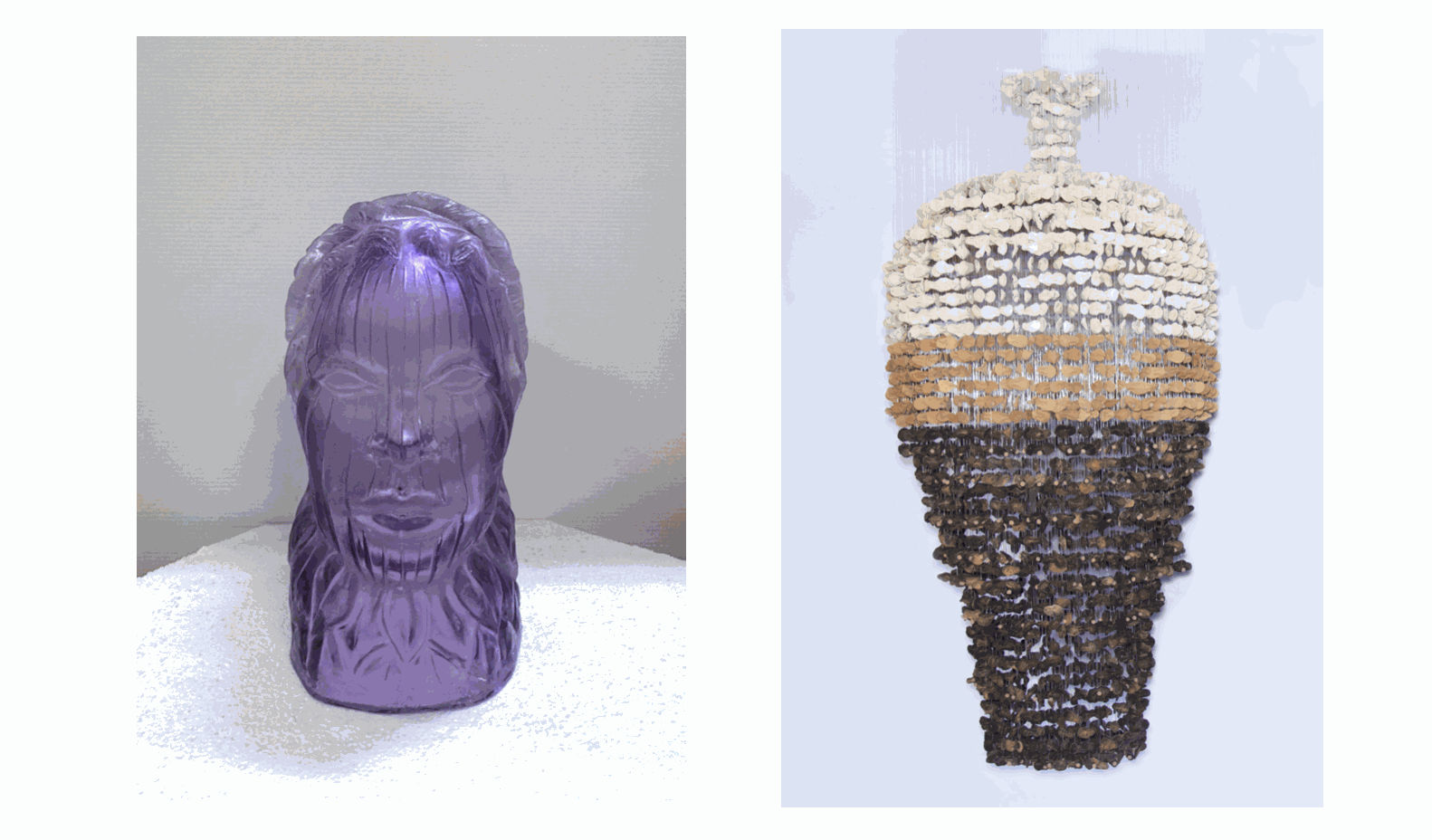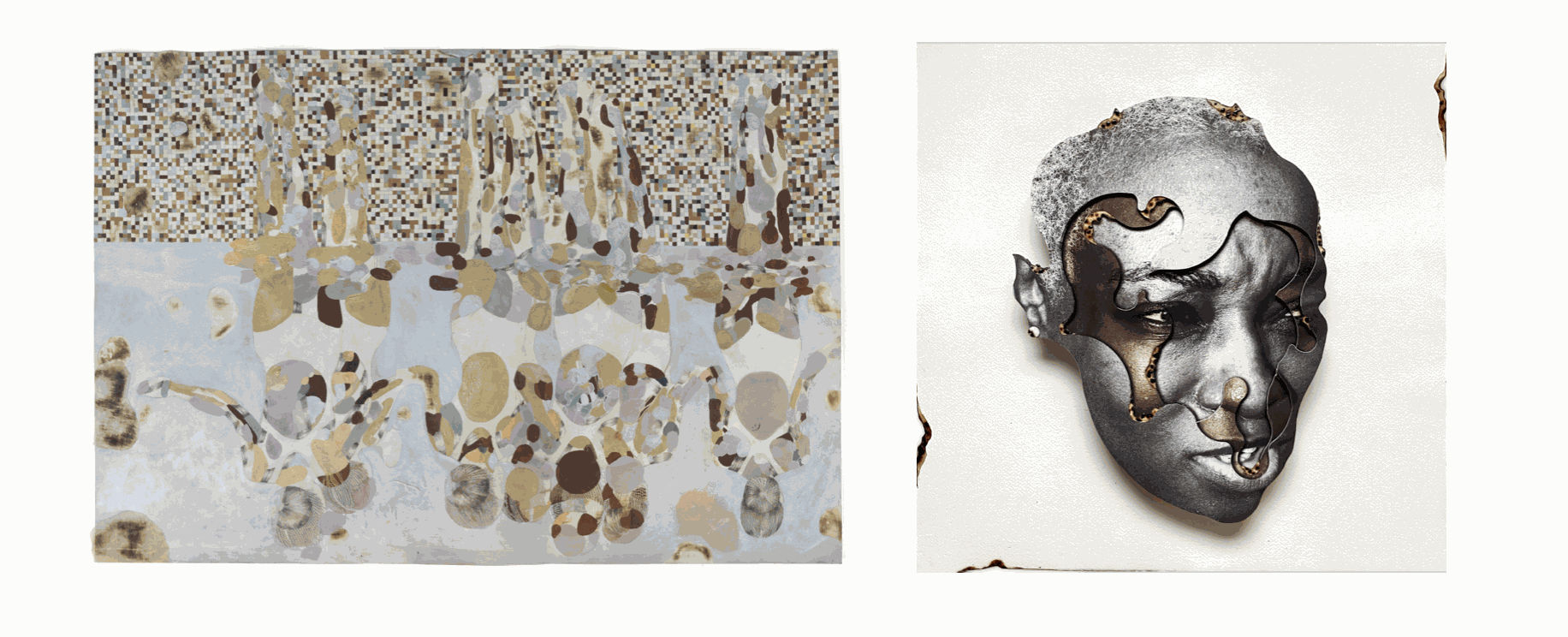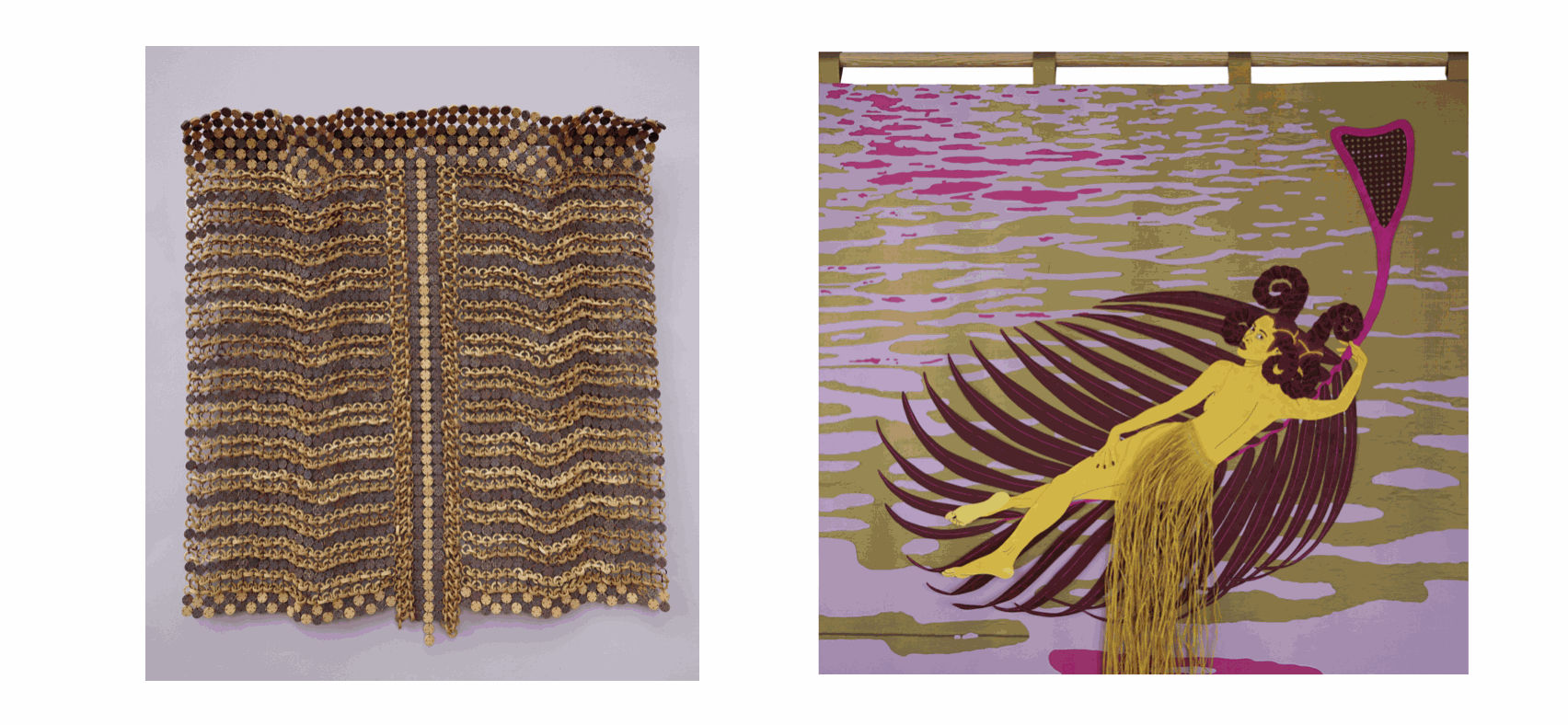Art X Lagos
kó is pleased to participate at Art X Lagos 2024 in Lagos, Nigeria.This presentation presents Layo Bright, Ngozi-Omeje Ezema, Modupeola Fadugba, Na Chainkua Reindorf, Mobolaji Ogunrosoye, and Ozioma Onuzulike, who work across ceramics, glass, collage, and mixed media painting.

(L) Layo Bright, Dawn (amethyst) #7, 2021/2024, Blown glass, 14 x 9 x 8 in. (R) Ngozi-Omeje Ezema, Earthbound, 2024, Ceramics, plastics, metal, 63 x 35.4 x 35.4 in.
Layo Bright’s sculptural practice explores migration, inheritance, legacy and identity through hybrid portraits, textiles, and mixed media works that highlight natural forms and ancestral memory. Employing a range of materials such as glass, clay, wood and textiles, these forms mirror fragile yet complex relationships with the personal, natural, and built environment. Bright’s work with plastic, checkered bags—often linked to migrants around the world—combines the material with crushed glass to critically address the inevitability of migration and loss in our current global climate. In fusing these and other materials, Bright’s practice carefully considers the legacy of suppressed histories within inequitable class structures.
Ngozi-Omeje Ezema’s sculptural installations, made by suspending hundreds of terracotta pieces, form the shapes of amorphous vessels. Ezema represents a new generation of contemporary Nigerian ceramists who infuse modernist sensibilities into an age-old traditional art form, radically challenging long-established notions that locate ceramics within the limiting frame of its utilitarian function. Her works explore the motifs of vases and leafs as expressive visual elements rich in affective metaphors, taking inspiration from the forms and materials of the natural environment. Using her personal experiences as a point of departure, her work addresses issues relating to identity, family and womanhood. The terracotta fragments are connected by translucent fishing wire and hung as free floating or wall-mounted works.

(L) Modupeola Fadugba, Silver Side Up?, 2023, Acrylic and graphite on burned canvas, 48 x 70 in. (R) Mobolaji Ogunrosoye, Portraits | Agboola, 2024, Photo collage; archival paper, coffee granules, burnt Fabriano paper, rough textured Fabriano paper, 22 x 22 in.
Modupeola Fadugba is a Nigerian multimedia artist working in painting, drawing, and socially-engaged installation. Her works explore cultural identity, social justice, game theory, and the art world within the socio-political landscape of Nigeria and the greater global economy. Her continuous body of work over the past decade delves into the concept of water and the swimming pool as a contested dialectical site full of possibilities for liberation and community-building. Originally trained in Chemical Engineering, the artist employs a unique technical skill-set to bring her surfaces to life, activating material science as a form of storytelling. Through the delicate burning of paper and incorporation of a variety of materials such as gold leaf, graphite, ink, acrylic, and oil, Fadugba explores the spatial composition and geometric patterns of swimming pools, experimenting with ideas of time, texture, and the tension between a work’s surface and the ideas lurking beneath.
Mobolaji Ogunrosoye uses the distortion of photography and collage to explore ideas around perception. Her practice revolves around ideation and exploring the different ways in which images of the female body may be distorted. In the Portraits series, Ogunrosoye creates multi-layer collages, incorporating a process of burning and cutting to create depth in revealing underlaying layers of images. The series addresses selfhood, body image, and the impact of societal influences on personal identity as it is related to Nigerian women.

(L) Ozioma Onuzulike, Zipped Armour for Datti, 2023, Earthenware and stoneware clays, iron oxide engobe and copper wires, 59 x 52.4 x 3.5 in. (R) Na Chainkua Reindorf, Drift, 2024, Acrylic gouache, Kraft-Tex paper fabric, Shantung silk, embroidery thread, raffia, rattan
60 x 60 in.
Ozioma Onuzulike’s large-scale ceramic works, resembling tapestries, are meticulously crafted from thousands of ceramic palm kernel beads and natural palm kernel shells. He explores the aesthetic and symbolic nature of clay-working, adopting a laborious process to achieve unique colors and textures in the clay, oxides, and glazes. Each ceramic undergoes bisque-firing and is dipped into ash glazes before being adorned with recycled glass. The pieces are woven with copper wire and allude to the West African textile traditions of Akwete, Aso Oke, and Kente. Inspired by the organic forms of palm shells, yams, and honeycombs, Onuzulike’s works serve as metaphors for the historical and sociological roots of turmoil in Africa. In the Palm Kernel Shell Bead series, Onuzulike considers the historical significance of the palm kernel shell as a symbol of currency in West Africa during the slave trade and its contemporary association with social status and wealth.
Na Chainkua Reindorf is a multidisciplinary artist with an interest in world-building and myth-making through the art of the masquerade, spanning painting, tapestry, and sculptural installation. Reindorf’s mixed media paintings serve as chapters in an elaborate narrative portraying a fictional female masquerade society. In Mawu Nyonu, meaning “God is a woman,” Reindorf imagines seven distinct and unruly fictional female avatars, drawing inspiration from personal experiences and West African folklore. Her mixed media paintings incorporate acrylic gouache, paper fabric, silk, embroidery thread, raffia, and rattan, with narrative scenes framed against bold colors and textures. Reindorf offers a reinterpretation of the predominately masculine traditions of West African masquerade to imagine the liberating possibilities of her female characters to gain control and self-expression.
This presentation features two works that display the personality and mode of Tokpe, a character (skin) who exists within the fictional secret world of Mawu Nyonu. Fashioned as one of seven alter egos of the artist, Tokpe represents the idea of caprice and unpredictability. She is depicted with yellow skin, two heads which represent dual and opposing personalities of pleasantness and troublesomeness, and raffia, which exists as an extension of her body in the form of a fringed curtain. Tokpe employs the raffia fringe as a portal to unknown worlds through which she draws in and casts out unsuspecting victims. Spirals are repeated throughout the works, from her hairstyle (referencing the elaborate Ekoi headdress of Nigeria and Cameroon) to the raffia skirt and fabric pattern. This symbol, which is both beautiful and dangerous, and is perhaps one of the best known naturally occurring phenomenon, best represents Tokpe’s nature — equal parts chaos and order, which is simultaneously predictable and unpredictable.
About Layo Bright (b. 1991, Nigeria)
Bright received her LL. B (Hons.) from Babcock University, was called to the Nigerian Bar Association and received her MFA in Fine Art (Hons.) from the Parsons School of Design. Bright has exhibited work both internationally and nationally. Solo and group exhibitions include: Dawn and Dusk, The Aldrich Contemporary Art Museum, Ridgefield, CT; Rockhaven, moniquemeloche, Chicago, IL; The Alchemists, Johnson Lowe Gallery, Atlanta, GA; Undercurrents, Sean Kelly Gallery, New York, NY; Lubeznik Center for the Arts, Michigan City, IN; Bode Projects, Berlin, Germany; Phillips, New York, NY; among others.
About Ngozi-Omeje Ezema (b. 1979, Nigeria)
Ezema’s solo exhibition, Boundless Vases, was held at kó in Lagos, Nigeria in 2021. Her first solo exhibition, Connecting Deep, was held at Centre for Contemporary Art (CCA) Lagos in 2018. She also participated in the First International Biennale in Centra China and Le Pinceau De L’Integration in Senegal, during the Dakar Biennale in 2016. She was commissioned for a special project installation at Art X Lagos in 2016. In 2019, she won the High Excellence Award at the Cheongju International Craft Biennale in South Korea. Ngozi-Omeje Ezema has participated in artist residencies with the Centre for Contemporary Art/ Trianglar Art Trust (Lagos), Goethe-Institut Nigeria (Nsukka), Sevshoon Art Centre (Seattle), Goethe Institute Ghana (Kumasi), and the Trianglar Art Trust (Jos). In 2021, Ezema was featured by kó as a Special Project at Abu Dhabi Art. Ezema is currently serves as a lecturer at the University of Nigeria, Nsukka, where she teaches ceramics.
About Modupeola Fadugba (b. 1985, Lomé, Togo)
Modupeola Fadugba was born in Togo and grew up in England and the United States as a child of Nigerian diplomats. A self-taught artist, she holds a Bachelors Degree in Chemical Engineering from the University of Delaware, a Masters in Economics from the University of Delaware, and a Masters in Education from Harvard University. Her interdisciplinary, research-based projects have engaged triumphant swimmers and lifeguards from Accra, Abuja, Lagos, Dakar, Philadelphia, and Harlem. Recent solo exhibitions include Why Nations Win at Alara in Lagos, 2021; Dreams from the Deep End at Gallery 1957 in Accra, 2018; and Prayers, Players & Swimmers at the Cité internationale des arts in Paris, 2017. In 2023, kó presented a solo presentation of her work at The Armory Show.
She has participated in numerous group exhibitions including the Royal Academy Summer Exhibition in London, 2020 & 2017; A Ballad for Harlem at The Schomburg Center for Research in Black Culture in New York, 2019, and Afriques Capitales in Lille, France, 2017. Her work was selected for the 2016 Dakar Biennale, where she was awarded a Grand Prize from the Senegal Minister of Communication. Her project The People’s Algorithm received the 2014 El Anatsui’s Outstanding Production Prize at Nigeria’s National Art Competition.
From this initiative Fadugba has developed The Artist’s Algorithm – a new series of exhibitions, essays, talks, games, performances, mentorship programmes, murals, and videos which aims to shed light on problems in education, politics, and governance through art. Experiences informing this ambitious project include research as a Fellow at the Smithsonian, 2019-2020, and collaborative learning studies through a Museum Education Practicum with The Studio Museum in Harlem, 2021. The documentary following her series, Dreams from the Deep End, where Fadugba worked with the Harlem Honeys and Bears, an all-Black senior synchronized swimming team based in New York, won an Emmy Award in 2022. Her work is included in the collections of the Smithsonian National Museum of African Art, Minneapolis Museum of Art, the University of Delaware, Chicago Booth School of Business, the Sindika Dokolo Foundation and the Liberian President, Ellen Johnson Sirleaf.
About Mobolaji Ogunrosoye (b. 1991, Lagos, Nigeria)
Moloblaji Ogonrosoye is a visual artist based in Lagos, Nigeria. In 2018, Ogunrosoye held her first solo exhibition at A White Space Creative Agency in Lagos. In 2022, she was included in the group exhibition Austere Imaginary at kó in Lagos. In 2023, she was featured in kó’s exhibition Optics in Lagos and the 1-54 Contemporary African Art Fair in New York. In 2023, Ogunrosoye was also featured in the exhibition About Damn Time at Sabo Art Advisory, Lagos; The Becoming at Peres Projects, Berlin; and Image Impressions, at FF Projects, Lagos. She has completed residencies at the Nolder Foundation, Ghana, and a virtual residency at Window, Winnipeg. In 2021, she was selected a finalist for the Art X Prize in Nigeria.
About Ozioma Onuzulike (b. 1972, Achi, Nigeria)
Ozioma Onuzulike graduated with First Class honors from the Department of Fine and Applied Arts, University of Nigeria, Nsukka. He is a fellow of the Civitella Ranieri Centre, Umbertide, Perugia, Italy, where he undertook a residency under the UNESCO-ASCHBERG Bursary for Artists, and an alumnus of the Skowhegan School of Painting and Sculpture, Maine, USA. His work is in the permanent collection of the Museum of Anthropology and Archeology, University of Cambridge, Princeton University Art Museum, Hamilton College, Coker College, Hudson Valley Museum of Contemporary Art, New York, and the Yemisi Shyllon Museum of Art, Lagos. In 2024, Onuzulike was listed as a finalist for the the seventh edition of Loewe Foundation Craft Prize, exhibited at the Palais de Tokyo in May 2024.
Onuzulike’s practice is closely associated with Nigeria’s prestigious Nsukka School in Southeastern Nigeria, renowned for its conceptual artistic processes employing natural and found materials. An influential center for art education in Nigeria, the Nsukka art department has been led by luminaries such as Uche Okeke, Chike Aniakor, Obiora Udechukwu, and El Anatsui, emphasizing the exploration of ideas, materials, and forms sourced from the environment. Onuzulike subsequently directed the art department at Nsukka, where he continues to teach and maintain his studio practice, currently serving as Director of the Institute of African Studies.
About Na Chainkua Reindorf (b. 1991, Ghanaian)
Raised in Ghana, Na Chainkua Reindorf earned an MFA in Creative Visual Arts from Cornell University and a BA in Studio Art from Grinnell College. In 2022, Reindorf was selected as one of three artists representing Ghana at the Venice Biennale. Her work has been exhibited across Africa, North America, and Europe. Recent exhibitions include Strange Flesh at Galerie Cecile Fakhoury, Dakar (2024); Up to No Good at Nubuke Foundation, Accra (2022), and Come, Let Me Spoil Your Things at Specialist Gallery, Seattle (2020). Reindorf has participated in recent group exhibitions at Fondation H, Madagascar (2024); Gallery 1957, Accra (2024); Kindl Center for Contemporary Art, Berlin (2023); PM/AM Gallery, London (2023); Anthony Brunelli Fine Arts, Binghamton (2023); and The Textile Center, Minneapolis (2022). In 2020, Reindorf received the FRAC Nouvelle Aquitaine MÉCA Residency Grant. Her work is in the collections of Fondazione Berengo, ANO Institute of Art and Knowledge, Bank of America Corporate Office, Enterprise Group, and Nubuke Foundation. Reindorf lives and works between San Juan, PR, and Accra, Ghana.

